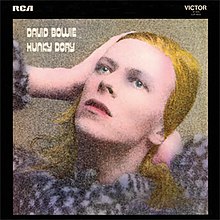Hunky Dory
| Hunky Dory | ||||
|---|---|---|---|---|
 |
||||
| Studio album by David Bowie | ||||
| Released | 17 December 1971 | |||
| Recorded | June–August 1971 | |||
| Studio | Trident Studios, London, England | |||
| Genre | ||||
| Length | 41:50 | |||
| Label | RCA Records | |||
| Producer | ||||
| David Bowie chronology | ||||
|
||||
| Singles from Hunky Dory | ||||
|
||||
| Professional ratings | |
|---|---|
| Review scores | |
| Source | Rating |
| AllMusic | |
| Blender | |
| Chicago Tribune | |
| Encyclopedia of Popular Music | |
| Pitchfork | 10/10 |
| Rolling Stone | |
| The Rolling Stone Album Guide | |
| Spin | |
| Spin Alternative Record Guide | 9/10 |
| The Village Voice | A− |
Hunky Dory is the fourth studio album by the English musician David Bowie, released on 17 December 1971 by RCA Records. It was his first release through RCA, which would be his label for the next decade. Hunky Dory has been described by AllMusic's Stephen Thomas Erlewine as having "a kaleidoscopic array of pop styles, tied together only by Bowie's sense of vision: a sweeping, cinematic mélange of high and low art, ambiguous sexuality, kitsch, and class".
The album has received critical acclaim since its release, and is regarded as one of Bowie's best works. Time chose it as part of their "100 best albums of all time" list in January 2010, with journalist Josh Tyrangiel praising Bowie's "earthbound ambition to be a boho poet with prodigal style". The style of the album cover, designed by George Underwood, was influenced by a Marlene Dietrich photo book that Bowie took with him to the photo shoot.
With new bass player Trevor Bolder replacing Tony Visconti, Hunky Dory was the first production featuring all the members of the band that would become known the following year as Ziggy Stardust's Spiders From Mars. Also debuting with Bowie, in Visconti's place as producer, was another key contributor to the Ziggy phase, Ken Scott. The album's sleeve would bear the credit "Produced by Ken Scott (assisted by the actor)". The "actor" was Bowie himself, whose "pet conceit", in the words of NME critics Roy Carr and Charles Shaar Murray, was "to think of himself as an actor".
Musical biographer David Buckley said of Hunky Dory, "Its almost easy-listening status and conventional musical sensibility has detracted from the fact that, lyrically, this record lays down the blueprint for Bowie's future career." The opening track, "Changes", focused on the compulsive nature of artistic reinvention ("Strange fascination, fascinating me/Changes are taking the pace I'm going through") and distancing oneself from the rock mainstream ("Look out, you rock 'n' rollers"). However, the composer also took time to pay tribute to his influences with the tracks "Song for Bob Dylan", "Andy Warhol" and the Velvet Underground inspired "Queen Bitch".
...
Wikipedia
